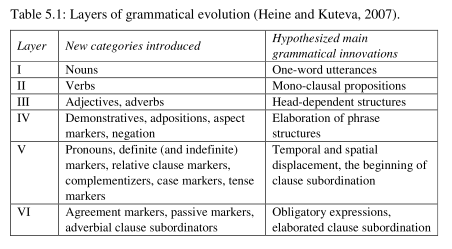In my previous post on linguistic replicators and major transitions, I mentioned grammaticalisation as a process that might inform us about the contentive-functional split in the lexicon. Naturally, it makes sense that grammaticalisation might offer insights into other transitions in linguistics, and, thanks to an informative comment from a regular reader, I was directed to a book chapter by Heine & Kuteva (2007): The Genesis of Grammar: On combining nouns. I might dedicate a post to the paper in the future, but, as with many previous claims, this probably won’t happen. So instead, here is the abstract and a table of the authors’ hypothesised grammatical innovations:
That it is possible to propose a reconstruction of how grammar evolved in human languages is argued for by Heine and Kuteva (2007). Using observations made within the framework of grammaticalization theory, these authors hypothesize that time-stable entities denoting concrete referential concepts, commonly referred to as ‘nouns’, must have been among the first items distinguished by early humans in linguistic discourse. Based on crosslinguistic findings on grammatical change, this chapter presents a scenario of how nouns may have contributed to introducing linguistic complexity in language evolution.


New reader here, so I am likely not in step with the appropriate tone for comments, but ….Yecch. Even for an abstract, that one is awful. Here is my quick rewrite:
Heine and Kuteva (2007) propose an alternative path for the evolution of grammar in human languages, based on observations made within the framework of grammaticalization theory. They hypothesize that nouns (time-stable entities denoting concrete referential concepts) were among the first items that early humans distinguished linguistically. This chapter presents one possible outline of the contribution that nouns made to early linguistic complexity in language evolution.
You may argue that this is merely a matter of style, but it strikes me as one of language devolution.
I’m sure Heine and Kuteva will be very grateful you went through the trouble of rewriting their abstract 😐
You’re right though: it does read awkwardly. Then again, I’m fairly confident that English is not their first language, so if you’re feeling generous you might want to rewrite the whole chapter 😀 . (Actually, having read some of the chapter, I think the rest reads perfectly fine. Maybe they had someone else write the abstract?)